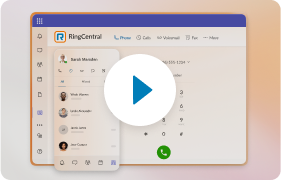According to RingCentral’s research, only 1 in 10 employees are remote champions. These “champions” are people who are happier and more productive when working remotely—and they’re more important to your team than you might expect.
Given that these remote champions are so uncommon, finding them and turning them into pillars of your remote culture can be a boon for you and your entire team. When you have an empowered workforce, it will lift your team and bring out everyone’s star potential.
Observe social cues to build an empowered workforce
If you want to understand which employees are struggling or thriving, remain in close communication and observe subtle clues. The more trust and open communication you have built with your team, the simpler it will be to see who’s doing well and who is struggling silently behind their computer screen.
Signs your workforce is struggling
- They miss deadlines or procrastinate. When someone struggles at work, they can lose motivation and have trouble executing their tasks or completing projects. An employee might have a good reason for missing a deadline once or twice, but if it becomes a pattern, it’s probably a sign they’re not thriving.
- They demonstrate apathy or fatigue. When you’re meeting with your colleague, do they seem to have low energy or appear uncommitted to their work? If someone consistently mentions that they’re tired or if their energy seems a little dull during your exchange, that can be a sign that they need an extra boost of motivation.
- They’re irritable. When you’re depressed, tired, or lacking motivation, this can often manifest as irritability. If a colleague constantly seems grumpy or irritable, it could be a sign that they’re struggling to work optimally.
- They have trouble communicating. When someone feels relaxed and confident, their words often flow effortlessly. The opposite is true for struggling team members, who may have difficulty explaining clearly and concisely what they want to say. They may also forget to answer emails or avoid direct communication because they don’t want people to see that they don’t have it all together.
- They’re easily distracted. When someone is having a tough time at work, it can be difficult to focus. Often, stress and worry can lead people to become distracted and unable to focus their attention on a conversation or the task in front of them. If an employee is always just about to start a project but never entirely in a state of flow, it could be a sign they’re distracted or struggling.
Talking to your teammates regularly, even if you’re not asking direct questions about their workflow, can provide insight into how they’re managing their work, experts say.
“If every time you call, they’re just about to start something, you know, you’ve got somebody who’s stuck; you’ve got somebody who is grappling with something,” explains Amie Devero, a professional management consultant. “You can’t see if they’re sitting at their desk with their head in their hands or if they’re attentive and engaged. You have to pick up a phone and talk to people you’re managing.”
Some business leaders have started using a variation of the popular test for scoring babies’ health, known as the APGAR stress test, to check if their employees and colleagues are burnt out. The acronym APGAR stands for appearance, performance, growth, affect control, and relationships.
By checking things like energy levels, ability to manage workload, and how your employees interact with your colleagues, you can get a good sense of how someone is doing.
“We carry thousands of emotions in our faces, and I think having at least some of your meetings with the camera on is really important,” says Darcy Boles, the head of employee experience at remote company TaxJar, and an expert in remote company culture.
“It’s really important to see facial expressions, and I do believe in weekly tracking sessions, in asking deeper questions and building relationships,” Boles continues. “People can say that remote makes work less human because we’re not in the office, but I disagree. I think it makes us much more human.”
Signs you have an empowered workforce
- They express enthusiasm. If your colleague often seems excited and enthusiastic about what they’re doing, you could have a remote champion on your hands. If everyone on your team consistently expresses enthusiasm, you probably have an empowered workforce.
- They come up with new ideas independently. These teammates are so engaged that they don’t wait for their managers to take the lead. An empowered workforce takes the initiative by suggesting new project ideas or innovating how things are done.
- They want to learn and improve. People who are enjoying their jobs and are thriving are generally also looking to learn and grow. That could mean they are often asking for feedback on their work, or it could show up as constantly taking extra classes or trying things they’ve never done before so that they develop new skills.
- They express their opinions freely. People who are thriving in their jobs feel confident enough to express their views, whether positive or negative. If one of your colleagues always has constructive input to share or some new insight, that could be a sign you’ve discovered a remote champion.
- They produce results. Someone who is thriving at work doesn’t have a lot of trouble meeting their goals. If someone on your team consistently produces work that has a significant impact, it’s a sign they’re enjoying their role.
- They create a vast social network from the comfort of their home (or co-working space). One of the perks of on-site work is having an extensive network of colleagues. Some of the best remote workers are people who can foster social connections from wherever they’re working, either through online coffee meetups, virtual happy hours, or even fun work meetings.
- They communicate openly with teammates about topics unrelated to work. Being relaxed enough to talk to your colleagues about all kinds of subjects is often an indicator that employees are thriving at work and feel like they’re part of an empowered workforce.
According to a survey from software company Buffer, 20% of remote workers said that communication is an obstacle for them. While that isn’t the majority of respondents, it’s still a sign that communication is something to pay attention to when you’re looking to build an empowered workforce.
“Am I sharing myself, and am I inviting others to share themselves with me? It may sound like this is tangential to performance, but it isn’t because what it’s telling you is that this person has the freedom to engage fully,” Devero says.
“If your mind is preoccupied with despair or loneliness or frustration or dissatisfaction, there’s a part of you you’re holding back. Whereas if you’re in some natural state of flow, you have the freedom to be with the people around you fully.”
Learn to identify the many faces of remote champions
Individual personality types and working styles play a significant role in whether someone is a champion of remote work, and not all remote champions are identical to one another. These are some of the examples of personality types that can thrive in a remote environment:
- Clear communicators. People with excellent communication skills are much more likely to succeed at remote work than people who need many contextual cues to understand. Someone who communicates clearly will be able to do so whether they’re in the same room as you or not, and that’s key to being a successful remote worker.
- Routine followers. One challenge that remote workers face is creating a daily routine that works for them and doesn’t lead to burnout. People who are naturally disciplined and can create and stick to their routines are more likely to thrive in a remote setting.
- The open-minded. Some of the biggest remote champions are willing to try all kinds of things to get their work done. Open-minded and adaptable people tend to thrive in remote work because they don’t need a specific work environment to perform or to feel like they’re part of an empowered workforce.
- The tech-savvy. To be successful at remote work, you must know how to use various online tools to communicate with your team and share work products. The more tech-savvy you are, the easier it is to be a remote champion. Tech-savvy employees glide seamlessly from one online platform to another, whether it’s for meetings, managing projects, or submitting their work.
- Collaborators. Remote work requires a strong desire to work with others despite the distance. People who enjoy collaborating are often effective remote workers because physical distance won’t stop them from reaching out and working as part of a team.
- Introverts. Some remote champions might work better when they’re on their own. Introverts tend to feel drained from too much social interaction, and they might be easily distracted or overwhelmed in an office setting. Introverts can be remote champions because working at a distance is the best option for their personality type.
Empower remote champions to take the lead
Once you’ve figured out which of your employees is a remote champion, it’s time to find ways that will allow their enthusiasm to bleed into the rest of the team and build an empowered workforce. That can mean finding ways to get their input or actively involve them in ensuring that your remote team’s work culture is healthy and robust.
- Show them you trust and appreciate their work. Giving your remote champions the freedom to take ownership of their work product is a great way to empower them. Employees who feel trusted and aren’t micromanaged are more likely to stay in their jobs and continue to be productive.
- Designate your remote champions as advocates for their teams. That could mean that they function as a liaison between their colleagues and management and are charged with listening to any challenges that come up and communicating them. This can create an empowered workforce by allowing your remote champions to take on a leadership role.
- Partner them with people who might be struggling. One great way to ensure that remote champions’ enthusiasm affects the rest of your team is by creating mentorship programs or buddy programs in which team members can support and lift each other. If you partner thriving teammates with their struggling colleagues, it will allow these remote champions to serve as an example to others and will help build an empowered workforce.
- Ask for their input on improving workflow. People who are doing well in their jobs are good people to ask for information because they can see the forest from the trees in ways that people who are stressed or experiencing challenges cannot.
According to Devero, managers can leverage what a remote champion is good at without showing favoritism.
“The danger is that somebody is a star, and then you neglect everybody else. So, give them positions of responsibility that require them to engage with their teammates,” Devero says.
“You don’t ever want to take your star and have them overshadow the rest of the team. You want to bring the rest of the team up to their level.”
Remote champions boost morale and productivity
Having a remote champion on your team can boost morale by showing the other colleagues that it’s possible to work optimally outside of an office.
When that person works to hype up the rest of their team, they can strengthen employee relationships, help build team cohesion, and boost everyone’s productivity.
Discover RingCentral’s hybrid work solutions here.
Updated Mar 13, 2025












